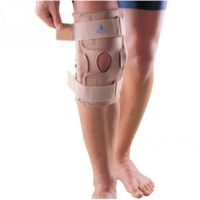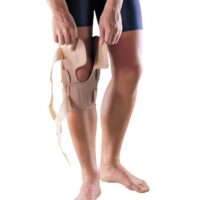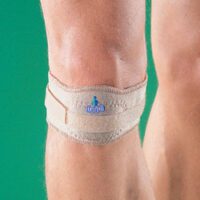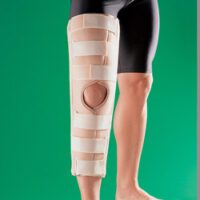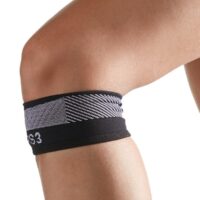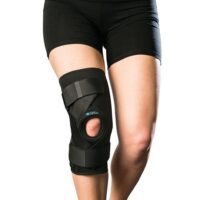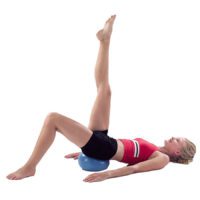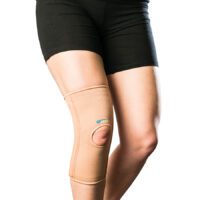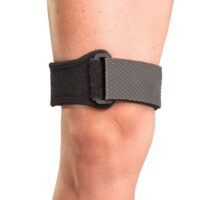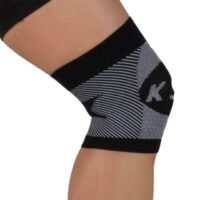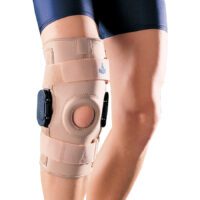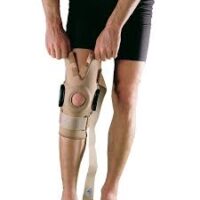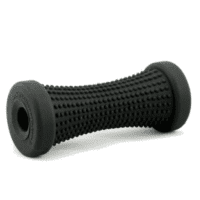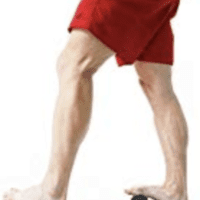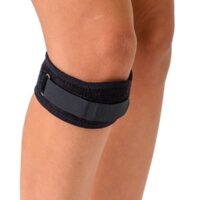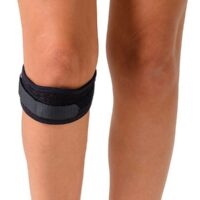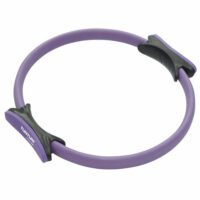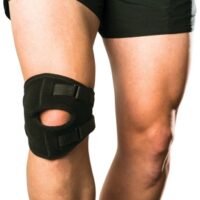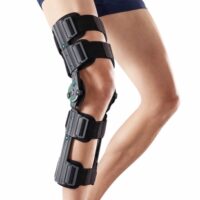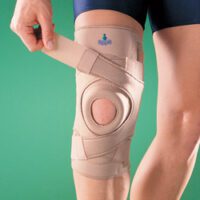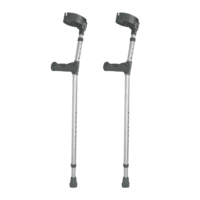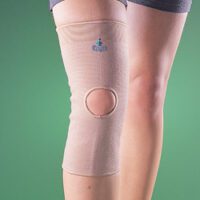LCL Injury - Lateral Collateral Ligament
Article by J.Miller, S.Armfield

LCL Injury
Your Pathway to Recovery
The Lateral Collateral Ligament (LCL) plays a critical role in knee stability. A comprehensive grasp of LCL injuries paves the way for effective treatment and a swift recovery. Though LCL injuries account for a mere 2% of knee ligament injuries, their impact demands attention. LCL injuries are also implicated in posterolateral corner instability so they should not be treated lightly.
What Causes an LCL Injury?
An LCL injury arises when a strong force stretches the knee joint beyond its normal range, often during sports or a misstep. Such forces can stretch, partially tear or completely rupture the ligament.
Assessing Injury Severity
LCL injuries range from Grade I sprains to Grade III tears. The symptoms vary, with some cases presenting mild discomfort and others causing severe instability.
Diagnosing the Injury
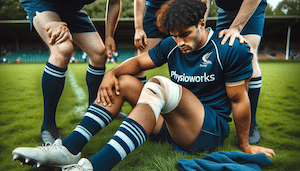
A thorough diagnosis, often involving an MRI, pinpoints the extent of an LCL injury. This step is crucial to tailor the recovery strategy to your needs.
Injury Healing Times
Recovery durations vary. Mild injuries may heal within weeks, whereas severe ones might need several months, each requiring a specific treatment approach.
Effective LCL Treatments
Treatment options span from physiotherapy and rest for minor injuries to surgery for severe tears. Committing to a physiotherapy program is pivotal for a full recovery.
Understanding LCL Surgery
Severe cases may call for LCL reconstruction surgery, with post-operative rehab being vital for regaining full knee function.
Preventing Injury Recurrence
A strong knee, bolstered by improved balance and agility, reduces the risk of re-injury. A personalised prevention program from your sports physiotherapist is essential.
Conclusion
Prompt, accurate diagnosis and a suitable treatment regime are keys to overcoming an LCL injury. Professional guidance ensures optimal recovery and helps prevent future issues. Please book an appointment with your physiotherapist if you are suffering lateral knee pain.
Rochedale - Call 38410277
Book Online: RochedaleSalisbury - Call 32751044
Book Online: SalisburySandgate - Call 32691122
Book Online: SandgateArticle by John Miller
Knee Pain Causes
Knee Pain Causes: An In-Depth Guide from a Physiotherapist's Perspective
Knee pain is a common complaint that can significantly impact your daily life. Understanding the causes of knee pain is crucial for effective treatment and prevention. This guide explores various knee pain causes and provides insights from a physiotherapist's perspective.


Common Causes of Knee Pain
Knee pain can stem from a variety of sources, ranging from acute injuries to chronic conditions. Let's explore some common causes:
Ligament Injuries
Ligament injuries are a significant cause of knee pain. These injuries often occur during sports or high-impact activities.
- ACL Injury: The Anterior Cruciate Ligament (ACL) is crucial for knee stability. ACL injuries can result from sudden stops or changes in direction. Symptoms include pain, swelling, and instability. Treatment often involves surgery and rehabilitation.
- PCL Injury: The Posterior Cruciate Ligament (PCL) can be injured in direct trauma to the knee. This injury also leads to pain and swelling, with treatment options ranging from physical therapy to surgery.
- MCL and LCL Sprains: Medial Collateral Ligament (MCL) and Lateral Collateral Ligament (LCL) sprains result from direct blows to the knee. These injuries cause pain and instability, often requiring rest, bracing, and physiotherapy.
Meniscus Injuries
Meniscus tears are another common knee injury. The meniscus is a cartilage that cushions the knee joint.
- Meniscus Tear: This injury often occurs from twisting or rotating the knee while bearing weight. Symptoms include pain, swelling, and difficulty moving the knee. Treatment options vary based on the tear's severity, ranging from rest and physiotherapy to surgery.
- Discoid Meniscus: This congenital condition results in an abnormally shaped meniscus, leading to pain and instability. Treatment may involve surgery to reshape or remove the meniscus.
Kneecap Pain
Several conditions can cause pain in the kneecap area, affecting your ability to perform daily activities.
- Chondromalacia Patella: Also known as "runner's knee," this condition involves the softening and breakdown of the cartilage on the underside of the kneecap. It causes pain and swelling, particularly when walking up stairs or sitting for long periods.
- Patellar Tendinopathy: Also called "jumper's knee," this condition results from overuse, causing pain at the front of the knee. Treatment typically includes rest, physiotherapy, and strengthening exercises.
- Patellofemoral Pain Syndrome: This condition involves pain around the kneecap, often resulting from overuse or misalignment. Treatment includes rest, physiotherapy to improve the patellar tracking, and proper footwear.
Knee Arthritis
Arthritis is a leading cause of knee pain, particularly in older adults. It causes inflammation and stiffness in the joints.
- Knee Osteoarthritis: This degenerative condition involves the wearing down of cartilage, leading to pain and swelling. Treatment includes physiotherapy, medication, and sometimes surgery.
- Rheumatoid Arthritis: This autoimmune condition causes inflammation in the knee joints. It requires medical management and physiotherapy to manage symptoms.
Knee Tendon Injuries
Tendon injuries can result from overuse or sudden, high-impact activities.
- Patellar Tendinopathy: This injury involves the patellar tendon, causing pain below the kneecap. Treatment includes rest, physiotherapy, and strengthening exercises.
- Quadriceps Tendinopathy: This condition affects the tendon connecting the quadriceps muscles to the knee, leading to pain above the kneecap.
Muscle Injuries
Muscle strains and related conditions are common knee pain causes, especially among athletes and active individuals.
- Hamstring Strain: This injury involves the muscles at the back of the thigh. It causes pain, swelling, and difficulty bending the knee. Treatment includes rest, ice, and physiotherapy.
- ITB Syndrome: The Iliotibial Band (ITB) can become tight and inflamed, leading to pain on the outer side of the knee. Stretching and physiotherapy are essential for recovery.
Knee Bursitis
Inflammation of the bursae, small fluid-filled sacs around the knee, can cause significant pain.
- Knee bursitis: Suprapatella bursitis is a common knee bursitis.
- Pes Anserine Bursitis: This condition involves inflammation of the bursa located on the inner side of the knee. It causes pain and swelling, with treatment focusing on reducing inflammation through rest, ice, and physiotherapy.
Children’s Knee Conditions
Young athletes can experience specific knee conditions related to growth and activity levels.
- Osgood Schlatter’s Disease: This condition involves inflammation of the area just below the kneecap where the tendon from the kneecap attaches to the shinbone. It causes pain and swelling, especially during activities.
- Sinding Larsen Johansson Syndrome: This condition affects the growth plate at the bottom of the kneecap, leading to pain and swelling.
Other Knee-Related Conditions
Various other conditions can lead to knee pain, necessitating a broad understanding of potential causes.
- Runner’s Knee: This condition involves pain around the kneecap, often resulting from overuse or misalignment. Treatment includes rest, physiotherapy, and proper footwear.
- Plica Syndrome: Inflammation of the plica, a fold in the knee lining, can cause pain and swelling. Physiotherapy and anti-inflammatory medications are common treatments.
What to Do?
If you're experiencing knee pain, seeking professional advice from a physiotherapist is essential. They can provide a personalised assessment and treatment plan to address your specific needs. Early intervention can significantly improve your outcomes and help you return to a pain-free, active lifestyle.
Conclusion
Understanding the causes of knee pain is the first step towards effective treatment. By addressing the root cause, you can find relief and prevent future issues. Consult a physiotherapist to develop a tailored plan for your knee health.
Rochedale - Call 38410277
Book Online: RochedaleSalisbury - Call 32751044
Book Online: SalisburySandgate - Call 32691122
Book Online: SandgateKnee Pain Causes FAQs
- What are the main causes of knee pain?
- Common causes include ligament injuries, meniscus tears, kneecap pain, arthritis, tendon injuries, muscle strains, and bursitis.
- How can I tell if my knee pain is serious?
- Serious knee pain often involves significant swelling, inability to bear weight, or visible deformity. Consult a physiotherapist or doctor if you experience these symptoms.
- Can knee pain be treated without surgery?
- Yes, many knee pain causes can be treated with physiotherapy, rest, and non-surgical interventions.
- What is the best treatment for knee pain?
- The best treatment depends on the cause. Physiotherapy, rest, strengthening exercises, and sometimes medication or surgery are effective options.
- How can I prevent knee pain?
- Prevent knee pain by maintaining a healthy weight, staying active, wearing proper footwear, and doing strength and flexibility exercises.
- When should I see a physiotherapist for knee pain?
- See a physiotherapist if your knee pain persists for more than a few days, is severe, or affects your ability to perform daily activities.
Related Articles
- Knee Osteoarthritis - Discover effective treatments for knee osteoarthritis.
- ACL Injuries - Learn about symptoms and treatment options for ACL injuries.
- Meniscus Tear - Understand the causes and treatments for meniscus tears.
- Patellar Tendinopathy - Explore treatment options for patellar tendinopathy.
- ITB Syndrome - Find out how to manage and treat ITB syndrome.
- Hamstring Strain - Tips for recovering from a hamstring strain.
- Runner’s Knee - Effective strategies to reduce knee stress for runners.
- Knee Arthroscopy - Learn about this surgical option for knee injuries.
- Quadriceps Tendinopathy - Understand the causes and treatments for this condition.
- Knee Bursitis - Discover ways to reduce inflammation and pain from knee bursitis.
These articles provide detailed information on various knee conditions and their treatments.
Knee Pain FAQs
Knee pain is a widespread issue, impacting individuals of varying ages and lifestyles. Causes range from injuries and wear and tear to conditions like arthritis. This FAQ section aims to provide insights into knee pain, covering diagnosis, ligament issues, ACL injuries, meniscal injuries, age and arthritis concerns, and pain relief methods through exercise and treatment.
Feel free to click on the questions to for deeper discussions into each topic.


Diagnosis Related
How Can I Determine If My Knee Injury Is Serious?
- Learn to assess the severity of your knee injury based on symptoms and situations.
How Can I Identify The Type Of Knee Injury I Have?
- Discover how different knee injuries manifest and what signs to look for.
When Should I Seek a Physiotherapist or Doctor for My Knee Injury?
- Find out the right time to consult professionals for your knee concerns.
Is Knee Clicking a Sign of a Serious Condition?
- Understand what knee clicking indicates about your joint health.
When Should I Consider Getting a MRI for My Knee?
- Learn about the circumstances when an MRI becomes necessary.
Why Has My Knee Suddenly Started Hurting?
- Explore potential reasons behind sudden knee pain.
Why Does My Knee Hurt On The Inner Side?
- Identify causes of inner knee pain and when to seek help.
Knee Ligament Related
What Are The Common Symptoms of a Torn Ligament in the Knee?
- Recognise the signs of a torn knee ligament.
Can I Walk With A Torn Ligament In My Knee?
- Understand the feasibility and risks of walking with a torn ligament.
ACL Related
What are the Consequences of Not Getting Surgery for an ACL Injury?
- Learn about the long-term effects of untreated ACL injuries.
What Are The Symptoms Of An ACL Tear?
- Identify the key signs of an ACL tear.
Meniscus Related
Is Surgery Necessary for a Meniscal Injury?
- Discover when surgery is essential for meniscal injuries.
Can a Torn Meniscus Heal Without Surgery?
- Find out if meniscal tears can heal naturally.
Age & Arthritis Related
At What Age Do Knee Problems Typically Begin?
- Learn about the onset age for common knee problems.
What are the Common Symptoms of Arthritis in the Knee?
- Identify arthritis symptoms in the knee.
Running Related
What are Some Ways that Runners Can Reduce Knee Stress?
- Explore methods for runners to minimise knee stress.
Knee Treatment & Exercise Related
Is Walking Good For Knee Pain?
- Understand the benefits of walking for knee pain.
What are Some Effective Ways to Relieve Knee Pain?
- Discover various methods to alleviate knee pain.
How Much Walking is Recommended for Individuals with Knee Pain?
- Learn the ideal walking duration for those with knee pain.





